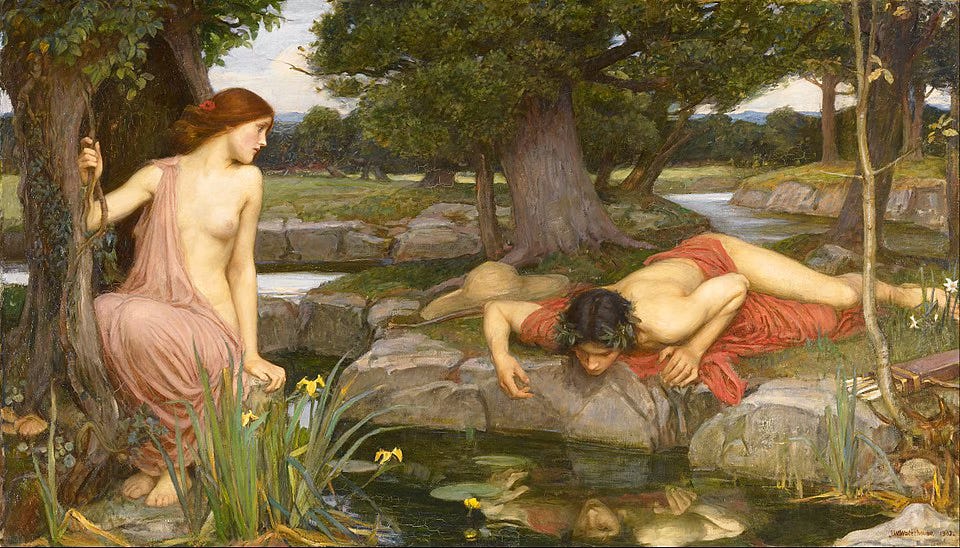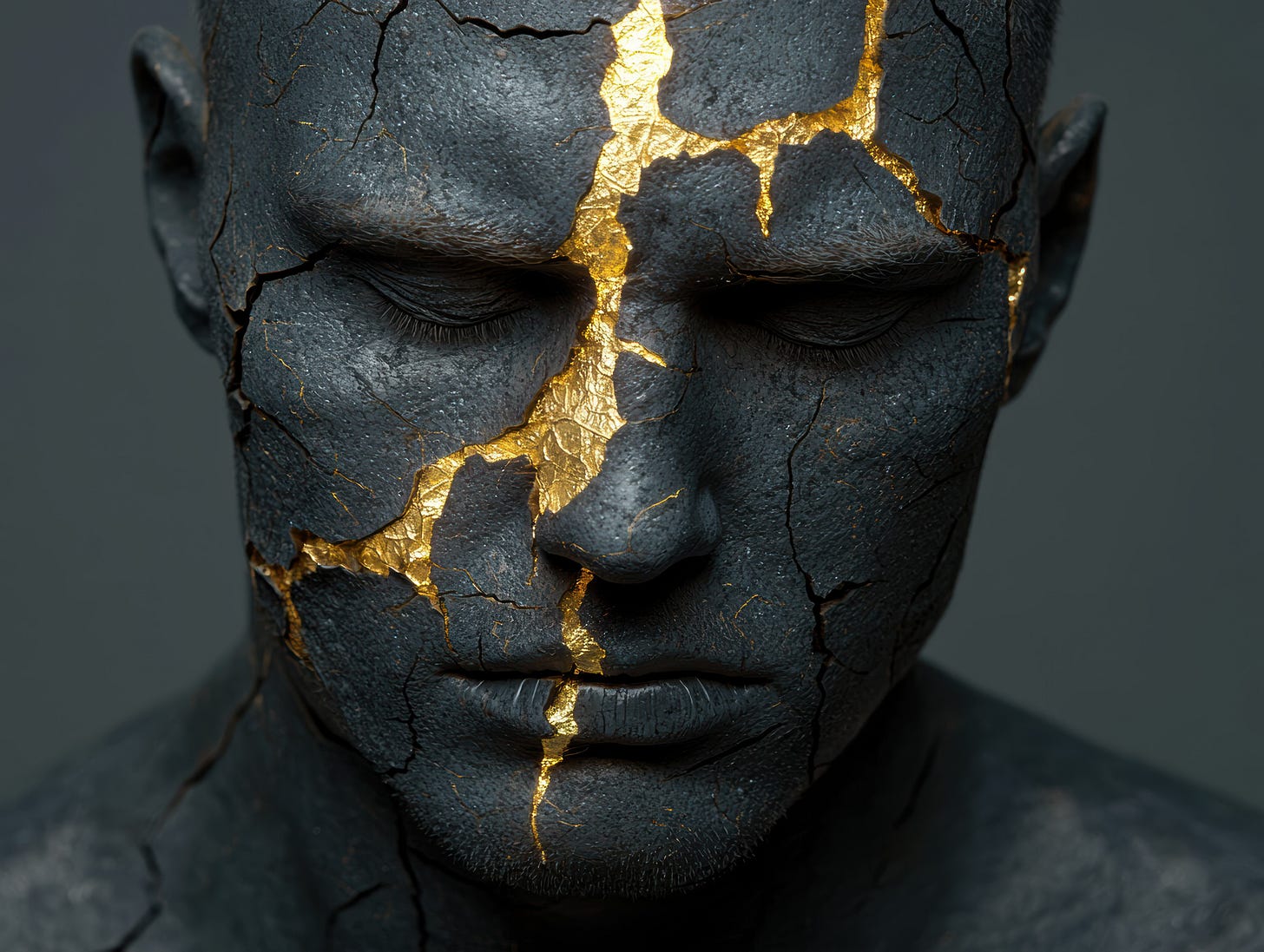What mythology can teach us about military parades
Narcissus and his personality disorder
I had to go back to my translation of Ovid’s Metamorphoses to remind me of the myth of Narcissus. How did everything go so wrong so fast?
Liriope was a single mom raising a teen, Narcissus. One day she sought out Tiresias, the blind seer with a reputation throughout Aonia for accurate forecasting. She could have asked anything - Will he marry a nice girl? Will I have grandchildren? Do you see any drawbacks to his being so drop-dead gorgeous? - but she settled on asking whether Narcissus “might attain a ripe old age.” His reply:
“If he but fail to recognize himself,
a long life he may have, beneath the sun,”—
“And why is that?” would have been a good follow-up question. We will never know how much Liriope paid for that cookie-fortune-length prognosis. Basically keep him away from mirrors and shiny surfaces - anything that would risk having him see his own image.
You probably know the rest. Years passed, Narcissus was out hunting on a hot day. Echo, besotted, followed him. The lad sat down by “a fountain silver-clear and bright” and bent over to take a drink. “And there beheld himself.” The one thing Tiresias told him not to do. In a trice he is caught in this hapless spiral:
All that is lovely in himself he loves,
and in his witless way he wants himself:—
he who approves is equally approved;
he seeks, is sought, he burns and he is burnt.
In some versions he falls into the water to pursue his beloved reflection and drowns. According to Ovid, the beautiful youth wastes away in grief and longing and dies there on the banks of the pool.
Fast-forward to the mid 20th century, Austrian-born American psychoanalyst Heinz Kohut coins the phrase narcissistic personality disorder. It first appeared in the Diagnostic and Statistical Manual of Mental Disorders, 3rd edition (DSM-3) in 1980. Abbreviated as NPD, it is characterized by nine symptoms (as summarized by Narcopath):
Grandiosity with expectations of superior treatment from other people
Fixated on fantasies of power, success, intelligence, attractiveness.
Self-perception of being unique, superior, and associated with high-status people and institutions
Needing continual admiration from others
Sense of entitlement to special treatment and to obedience from others
Exploitative of others to achieve personal gain
Unwilling to empathize with the feelings, wishes, and needs of other people
Intensely envious of others, and the belief that others are equally envious of them
Pompous and arrogant demeanor
Exposed as we all are to a daily diet in the media of examples from this list, we are more well-versed in NPD than we might imagine. I mean, I can even see a few of these in myself, particularly #4 which has been on my wish list since I was a child. Regarding #2 (fantasies of attractiveness) I am often disappointed how unlike George Clooney I look in the mirror. But can we imagine one person having all nine of these symptoms on full display? Yes, we can.
Zipping back to the year 8 CE. Narcissus’ problem was that he saw his reflection, fell in love with what he believed to be some other being, and suffered unrequited love. But his real downfall was finally having to acknowledge what was really going on — he had a huge crush on himself. In Tiresias’ words, he recognized himself. Thus, did the youth fail to have “a long life…beneath the sun.”
I am imagining now a parallel universe where another Narcissus has a kind of psychotic breakdown. At some deep level he is conflicted. He realizes he can not possibly give himself the fervent love he desires. To resolve the conflict, he unconsciously out-sources the job of being obsessed — to everyone else.
The purpose of every action he takes is to project his identity out to the World: his trade deals, his executive orders, his federalization of national guard troops, his beautiful bill. Befitting our neo-Narcissus, he loves the word “Beautiful.”
There would be no death scene by the river for this supercharged Narcissus!
I have always placed a high value on the ability to reflect on oneself. To periodically take stock in the service of bettering one’s life. If I have a blindspot or a major fault, I want to know about it first so I can figure out what to do. It can be difficult work, but it offers so many benefits.
Imagine what this new Narcissus could do without the encumbrance of self-reflection. The nine symptoms? He masters them all, without shame, without accountability and, most importantly, without awareness.
He has fashioned for himself a huge parade in two days’ time. Even got the taxpayer to foot the $50M bill. The streets will tremble with tanks, the sky burn with aircraft, and some will watch the army procession with honor and praise.
But no one’s eyes will gaze more longingly, more passionately, than his.
Ovid’s telling is full of sad irony — the tragic flaw of a single vain youth. Here when he first falls in love with himself:
He knows not what
he there beholds, but what he sees inflames
his longing, and the error that deceives
allures his eyes. But why, O foolish boy,
so vainly catching at this flitting form?
Today, the implications of Narcissus’ tragic flaw is unleashed on the rest of us, and has a childish cruelty the original lacks. Today, others suffer the consequences for “the error that deceives” this guy.
Notes:
https://www.perseus.tufts.edu/hopper/text?doc=Perseus%3Atext%3A1999.02.0028%3Abook%3D3%3Acard%3D337
https://www.politico.com/news/magazine/2024/09/01/mag-trump-beautiful-test-00174449





So many inferences to make from the tale of Narcissus to our current political scene. Appreciation for spectacle over substance has been a developing theme for some time, and in that, we become complicit. Our lust for reality television. Our search for heroes. Our vicarious admiration for those who accumulate wealth.
I wonder about Echo. What happened to her after Narcissus perished? And Liriope? Interesting that the plant we name after her is sturdy and, once established, very hard to remove.
I also wonder about what the Narcissus flower tells us, the one that sprang up after its namesake died. Dare I hope that it wants to teach us that something new and more beautiful can emerge — if we learn from the fall?